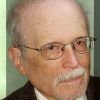 Michael Wyschogrod is an American Orthodox Jewish theologian. He writes a piece asking the question: ‘Why Was and Is the Theology of Karl Barth of Interest to a Jewish Theologian?’ Wyschogrod resonates with the theology of divine initiative and the theology of the Word that both play such central roles in Barth’s theology.
Michael Wyschogrod is an American Orthodox Jewish theologian. He writes a piece asking the question: ‘Why Was and Is the Theology of Karl Barth of Interest to a Jewish Theologian?’ Wyschogrod resonates with the theology of divine initiative and the theology of the Word that both play such central roles in Barth’s theology.
Of particular note are some remarks he makes on Barth’s ‘loyalty to the scriptural’ which Wyschogrod describes as ‘a spiritual conversion to Israel’s mind:’
That Barth is the first Christian theologian to look to scripture for his foundation would be impossible to maintain. Luther and Calvin were also, of course, scriptural in a very fundamental way. And yet, there is a difference. Strangely enough, perhaps it is the historical perspective that any writer in the twentieth century, even one as resistant to historical relativization as Barth, brings to his work. For Luther and Calvin it was probably not altogether clear that the Bible was an ancient document which must be read by means of an attempt to penetrate the minds of the ancient Jews to whom the Word of God was addressed. Barth is not primarily a historian; Bible-centered as he is, he is not a Hebrew scholar (his Greek and Latin are clearly superior to his Hebrew, unfortunately) and he does not capitalize on the latest advances in “scientific” biblical scholarship. Nevertheless, there is a very clear recognition of the distance in space and time between Jerusalem and Basel and the result of this is that Barth does not carry as much of his Swiss identity into his work as might otherwise have been the case. Consciousness of the historical alone is not sufficient for the achievement of this attachment to a God who has, as it were, hyphenated his name to that of Israel so that the two move through history together. This is proven by Bultmann who, historian that he is, also remains splendidly gentile to an amazing extent. But Barth, I think, does not remain a gentile, which is to say, he becomes a Christian.
The category of history has dominated — some would say devoured — biblical studies in the last two centuries. To many, history is a category which problematizes our reading of the Bible. After countless cases of context amnesia, some problematizing is called for. We need to be reminded that the scriptures don’t fit snugly into our lives, that they weren’t written by 21st-century suburban American Christians and began in another time and place.
Too often, though, biblical scholars move from a consideration of the time of Scripture’s composition to a declaration of it as time-bound. The problem, as Lessing put it, is that accidental truths of history can never be used to establish universal principles of reason. So, the historical remains merely historical. To declare something historical is to lock it away in something called ‘the past.’ What Barth realized, though, is that Lessing’s ditch (one into which biblical scholars have been falling for close to two centuries) is merely another instance of humanity’s sinful attempt to evade God. If we can only speak of Jesus as ‘then and there’ we won’t have to face him here and now.
Still, God is Lord of history, and Barth was too smart to think that he could simply undo historical criticism. As Wyschogrod points out, Barth actually modeled an awareness of historical and cultural distance in reading the biblical text as a text rooted in Jewish soil — but this was always a distance that trusted that the Word would be brought near as he listened to the voice of God in the text. In recognizing that Basel is not Jerusalem, in allowing Jerusalem to be Jerusalem and in caring for and attending to Jerusalem as Jerusalem, Barth learns to hear the Spirit speak of and to Basel. In fact, it was his calm assurance that the God who spoke then continues to speak now in these very old texts that gave Barth the patience and courage to enter what he called ‘the strange new world within the Bible.’